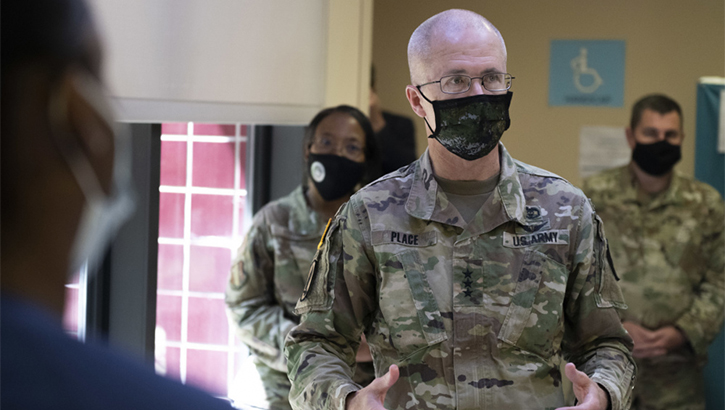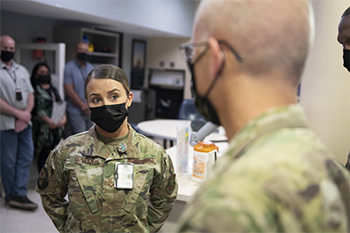DHA leadership recognizes, advances 60th MDG mission
 Senior Airman Jessica McVean, 60th Inpatient Therapeutic Squadron technician, briefs Army Lt. Gen. Ronald Place, Defense Health Agency director, May 10, 2021, at Travis Air Force Base, California. Place and Command Sgt. Maj. Michael Gragg, DHA senior enlisted advisor. (U.S. Air Force photo by Senior Airman Jonathon Carnell)
Senior Airman Jessica McVean, 60th Inpatient Therapeutic Squadron technician, briefs Army Lt. Gen. Ronald Place, Defense Health Agency director, May 10, 2021, at Travis Air Force Base, California. Place and Command Sgt. Maj. Michael Gragg, DHA senior enlisted advisor. (U.S. Air Force photo by Senior Airman Jonathon Carnell)
Army Lt. Gen. Ronald Place, Defense Health Agency director, and Command Sgt. Maj. Michael Gragg, DHA senior enlisted advisor, visited David Grant USAF Medical Center at Travis Air Force Base in California to recognize Airmen involved with COVID-19 relief and vaccine administration May 10, 2021, at Travis Air Force Base, California.
Place and Gragg traveled across multiple clinics in DGMC to have conversations with 60th Medical Group Airmen about their struggles and successes providing COVID-19 relief.
“This healthcare facility and installation responded very quickly to the pandemic,” Place said. “Getting feedback from the airmen who have and are responding to the pandemic is the best way forward to know what they need.”
Place said he maintains full confidence in the 60th MDG airmen to deliver on COVID-19 relief and vaccination efforts, but, across the Department of Defense, record management needs to be improved.
 Senior Airman Jessica McVean, 60th Inpatient Therapeutic Squadron technician, briefs Army Lt. Gen. Ronald Place, Defense Health Agency director, May 10, 2021, at Travis Air Force Base, California. Place and Command Sgt. Maj. Michael Gragg, DHA senior enlisted advisor. (Photo by Air Force Senior Airman Jonathon Carnell.)
Senior Airman Jessica McVean, 60th Inpatient Therapeutic Squadron technician, briefs Army Lt. Gen. Ronald Place, Defense Health Agency director, May 10, 2021, at Travis Air Force Base, California. Place and Command Sgt. Maj. Michael Gragg, DHA senior enlisted advisor. (Photo by Air Force Senior Airman Jonathon Carnell.)
From the 60th MDG Intensive Care Unit to the COVID-19 vaccine team, Place stressed the importance of standardizing record keeping throughout the DOD.
“Through all the trials and tribulations that we’ve gone through as a military, it’s important that our medical providers are all trained on the same system,” Place said.
That system is MHS GENESIS, an electronic health record that went live at Travis AFB on Sept. 7, 2019.
The system is designed to allow TRICARE beneficiaries to exchange secure messages with their care team; schedule medical appointments and access notes, labs and medications; and request prescription renewals online.
“This file system is a great resource for us to keep track of Department of Defense personnel and beneficiaries who have received their vaccinations,” Place said. “The pilot phase of MHS GENESIS at Travis AFB showed a positive impact to patient care.”
On April 24, 2021, the MHS deployed the MHS GENESIS system to 25 military hospitals and clinics across 12 states, bringing the MHS GENESIS deployment to nearly 30% complete, according to the Health.mil website that holds a timeline of MHS GENESIS progression points.
Place and Gragg will continue touring military installations to support MHS leaders with the transition to MHS GENESIS.